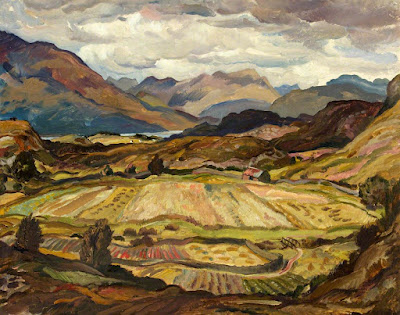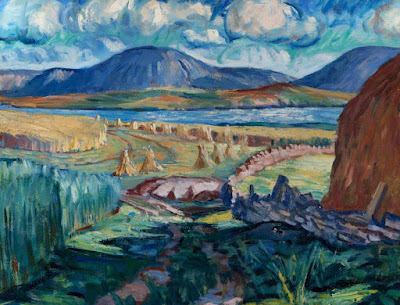I now return, having survived a paucity of beauty and truth over the past two months by reading haiku -- one in the morning and one in the evening -- from R. H. Blyth's four-volume Haiku, and by eventually returning to my walks. I became accustomed to brevity followed by silence. Not a bad thing.
One day earlier this month, I returned to a favorite passage:
"More than half a century of existence has taught me that most of the wrong and folly which darken earth is due to those who cannot possess their souls in quiet; that most of the good which saves mankind from destruction comes of life that is led in thoughtful stillness. Every day the world grows noisier; I, for one, will have no part in that increasing clamour, and, were it only by my silence, I confer a boon on all."
George Gissing, The Private Papers of Henry Ryecroft (Archibald Constable & Co. 1903), pages 13-14.
Of course, this sort of thing (a variation on Pascal) is unrealistic and irresponsible, isn't it? A pernicious daydream, deluded and selfish. And yet . . .
The stillness;
A bird walking on the fallen leaves:
The sound of it.
Ryūshi (d. 1681) (translated by R. H. Blyth), in R. H. Blyth, Haiku, Volume 4: Autumn-Winter (Hokuseido Press 1952), page 365.
Alexander Sillars Burns (1911-1987), "Afternoon, Wester Ross"
Until a week or so ago, autumn here was unusually sunny and rain-free. The leaves on many of the trees remain green, but they have dried out. The leaf-shadows and sunlight still sway together on the ground, but with less definition, less depth. On a breezy day, the sound overhead has changed: little by little, sibilance has turned to a faint rustling.
Leaves
The prisoners of infinite choice
Have built their house
In a field below the wood
And are at peace.
It is autumn, and dead leaves
On their way to the river
Scratch like birds at the windows
Or tick on the road.
Somewhere there is an afterlife
Of dead leaves,
A stadium filled with an infinite
Rustling and sighing.
Somewhere in the heaven
Of lost futures
The lives we might have led
Have found their own fulfilment.
Derek Mahon, The Snow Party (Oxford University Press 1975).
For me, autumn is not autumn without a visit to Mahon's "Leaves." I return for the poem as a whole, but -- ah! -- the last two lines of the second stanza: the very heart of autumn.
People are few;
A leaf falls here,
Falls there.
Issa (1763-1828) (translated by R. H. Blyth), in R. H. Blyth, Haiku, Volume 4: Autumn-Winter, page 364.
Adam Bruce Thomson (1885-1976), "Harvesting in Galloway"
Every autumn, there is a particular view that I treasure. My usual walking route takes me along the brow of a low hill, about a quarter-mile long. The hill slopes down toward a meadow to the west. As I approach the end of the brow to descend, the highest boughs of three maples that lie in the meadow below appear just beyond the edge of the brow. Their leaves are a brilliant deep-red at this time of year. As I get closer to the edge, the trees are revealed bit-by-bit, from tip to trunk. And, finally, there they are: standing in a serene row as I walk downward toward them.
A Day in Autumn
It will not always be like this,
The air windless, a few last
Leaves adding their decoration
To the trees' shoulders, braiding the cuffs
Of the boughs with gold; a bird preening
In the lawn's mirror. Having looked up
From the day's chores, pause a minute,
Let the mind take its photograph
Of the bright scene, something to wear
Against the heart in the long cold.
R. S. Thomas, Poetry for Supper (Rupert Hart-Davis 1958).
"Life that is led in thoughtful stillness." This is neither indolence nor impassivity.
The wind brings
Enough of fallen leaves
To make a fire.
Ryōkan (1758-1831) (translated by R. H. Blyth), in R. H. Blyth, Haiku, Volume 4: Autumn-Winter, page 357.
Ian MacInnes (1922-2003), "Harvest, Innertoon" (1959)
As I have said here in the past: this is the season of bittersweet wistfulness and wistful bittersweetness. "You sound like a broken record." This is a phrase that was common in the days of my youth (the Sixties and the Seventies). I'm afraid that it applies to me, a nattering Baby Boomer who looks back on a lost world. Before long, I will be recounting fond memories of neighborhood families raking oak leaves into piles, and setting them ablaze as dusk fell on a Minnesota evening. And, yes, I do remember quite well the smell of burning leaves.
Under Trees
Yellow tunnels under the trees, long avenues
Long as the whole of time:
A single aimless man
Carries a black garden broom.
He is too far to hear him
Wading through the leaves, down autumn
Tunnels, under yellow leaves, long avenues.
Geoffrey Grigson, The Collected Poems of Geoffrey Grigson, 1924-1962 (Phoenix House 1963).
Am I being sentimental about autumn? One sometimes hears derisive comments about "sentimentality." Oh well.
The autumn of my life;
The moon is a flawless moon,
Nevertheless --
Issa (translated by R. H. Blyth), in R. H. Blyth, Haiku, Volume 3: Summer-Autumn (Hokuseido Press 1952), page 396.
Adam Bruce Thomson, "Still Life at a Window" (1944)







10 comments:
You've given us a lovely autumnal collection of poetry and images. I especially love the R.S. Thomas poem, and the Burns painting. The painting looks like fall, for sure, but there is so much color... maybe resembling the temperate version of the season we experience where I live. Not everything dies.
It's good to hear that you are recovering from your illness and able to get out more again, enjoying the "wistful bittersweetness" of nature in person. You don't sound like a broken record, and not even the very same intact record played again and again, though I wouldn't mind the latter. The same good and beautiful and true things are forever worth retelling.
It is wonderful to have you back in the land of the living! Speaking of which, I am reminded of a poem I clipped out of the Japan Times decades ago and cannot find now. Something along the lines of...
“Having lived so long in a foreign land
I know how it is the dead forget the living
And stay contented”
Your absence had been noted, and deplored. Welcome back.
Stephen, so sorry to hear you have been unwell. I hope you are now fully recovered. I must also apologise for my own long absence here, a very busy year with work and family matters. I always read you posts, but have not had adequate time and space to respond.Your post contains so many delights and reminders. I have recently been dipping into The Private Papers of Henry Ryecoft myself, a book one never gets tired of returning to, and thank you for the lovely Geoffrey Grigson poem, which is wholly new to me.
GretchenJoanna: Thank you very much for your kind words. I know you are fond of Thomas' poetry, so I'm pleased you like the poem. (It's hard to find: for whatever reason, he chose not to include it in subsequent selected or collected editions of his poems.) Yes, the Burns painting is lovely, isn't it? I agree that the color is amazing: that small valley of serenity between the mountains and the water.
Thanks for your thoughts about broken records. Your final sentence is perfect. (Not that it applies to what I say! I'm thinking of the poets and painters who appear here, and to the World as a whole.)
As ever, thank you so much for visiting, and for sharing your thoughts.
Esther: That's very nice of you. Thank you so much.
Those are indeed wonderful lines. If you ever come across the entire poem, please share it. I've only all too briefly lived in a foreign land, but the feeling expressed is understandable.
This is no doubt of tenuous relevance, but the lines brought to mind the following untitled poem by Mary Coleridge:
Are the dead as calm as those
They leave behind them, friends or foes?
However a man may love or fight
Calm he falls asleep at night!
Fast the living sleeps and well;
But the spirits -- who can tell?
Are they as a rushing flame
For the Sun from whence it came,
Driven on from star to star,
Where the other dead men are?
(Theresa Whistler (editor), The Collected Poems of Mary Coleridge (1954), page 214.)
I hope that all is well. Take care.
Tristan: Thank you very much for the thoughts. And for not giving up on me! It's good to be back, and I'm happy you are still visiting.
I hope you are well, and back to walking. I count on your selection of poems and commentary to maintain sanity in this increasing chaotic world.
John: Please accept my apologies for the delay in responding to your comment. On the other hand, there is no need for you to apologize for not having submitted a comment for a while: I completely understand. I am just happy to know that you are still visiting. As I have said before, I greatly value your long-time presence here.
I'm pleased you liked the poem by Grigson. (I came across it in an anthology of poems about trees: Trees Be Company (2001), which was published in the UK. The same organization also published anthologies of poems about fields (Field Days) and rivers (The River's Voice). I recommend all of them.) I have read some of his prose works, but I have been intending to explore his poetry further.
Yes, The Private Papers of Henry Ryecroft is a fine book, isn't it? I've always found it sad that, first, it was published in the year of Gissing's death at a young age, and, second, that, despite its autobiographical elements, he never was able to enjoy the brief end-of-life idyll that his alter ego Henry Ryecroft experienced.
I hope that all is well. Wishing you all the best as we enter into the holidays.
Mr. Ireland: I was delighted to receive your comment. I'm happy to know that you continue to visit. Thank you very much for being here all these years.
And thank you as well for your kind thoughts. A "chaotic world," indeed. We do need a respite, don't we? But, on the other hand, the world has always been chaotic, hasn't it?
I was reminded of something along these lines when I revisited a wonderful video last week: the performance of "My Back Pages" at the 1992 concert celebrating the 30th anniversary of Bob Dylan's first record release. I believe it was the second to last song in the concert, and the performers on the song are Dylan, Roger McGuinn, George Harrison, Neil Young, Eric Clapton, and Tom Petty (each of them singing a verse, and Young and Clapton providing short guitar solos). Quite a line-up, I would say. (I confess: every time I watch the video I get a lump in my throat. That no doubt marks me out as a nostalgic, sentimental Baby Boomer, doesn't it? True, with no apologies.) I suspect you are aware of the performance. Dylan wrote the song at the age of 23, or thereabouts, and it was recorded in 1964. Well, a great deal of chaotic water has passed under the bridge since then, hasn't it?
Thank you very much for visiting again, and for your kind words. Take care.
Post a Comment